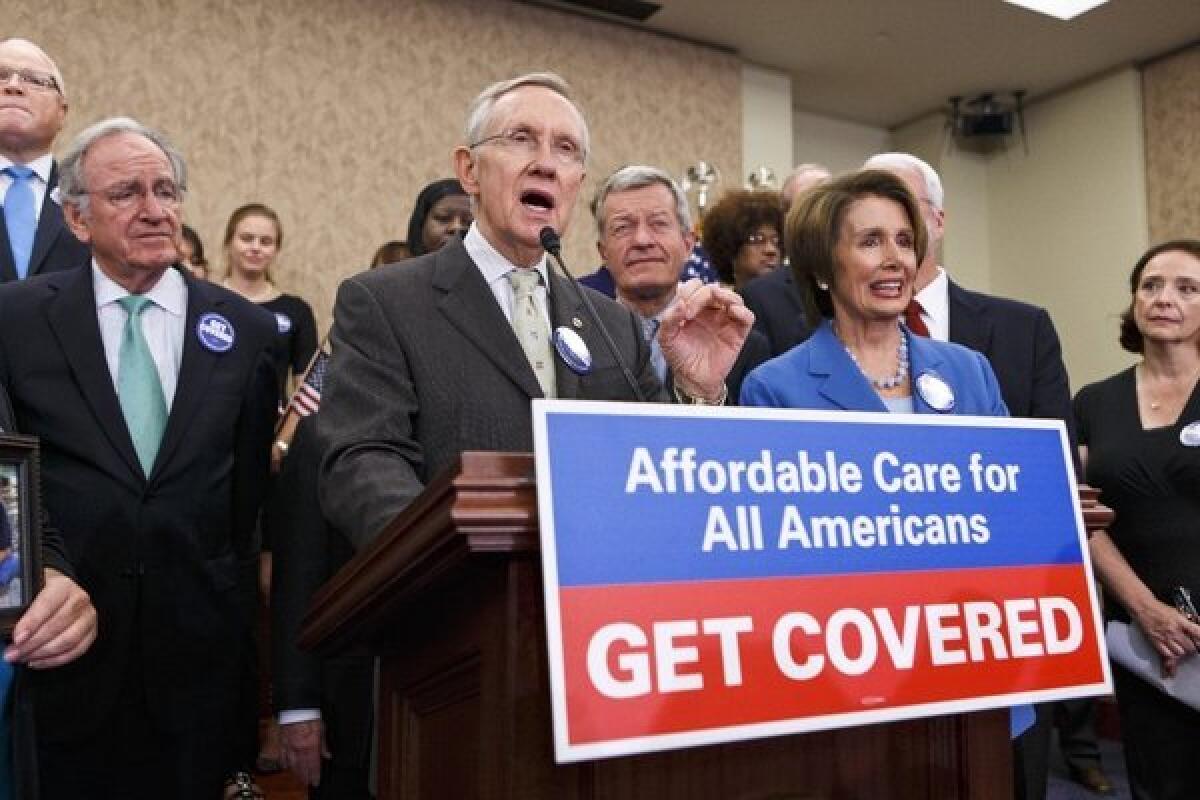The unsettled healthcare law

- Share via
Ever since Obamacare’s stormy passage in early 2010, Democrats have been waiting anxiously for the program to go into effect and hoping that a dose of reality would calm the partisan battles over the health insurance plan. Once everything was up and running, they hoped, skeptical Americans would see that Obamacare was a good idea all along — and reward the party that brought it to them.
FOR THE RECORD:
A previous version of this article incorrectly said Congress passed the Affordable Care Act in 2011. The bill was passed in 2010.
That’s looking unlikely, at least in the short run. Last week’s glitch-filled rollout of Obamacare’s health exchange websites, combined with Republicans’ furious refusal to accept the program as what President Obama calls “settled law,” confirmed something political strategists in both parties had already predicted: The war over Obamacare is far from over.
“It’s unlikely that the Affordable Care Act will be widely popular until people have real experience with it — until it becomes the new normal,” a leading Democratic strategist told me. “We’re talking about years, not weeks or months.”
Nobody expected the launch of a fleet of balky websites to make an immediate difference to perceptions of the health insurance plan, not even with endorsements from icons like Lady Gaga, who managed to get the main website address wrong in her promotional tweet.
Still, the opening-day problems and the slow pace of applications for health insurance were not encouraging signs.
More important, in the long run, was the Republican Party’s reaffirmation — spurred by Sen. Ted Cruz (R-Texas) and other tea party legislators — that repealing, defunding or dismantling the program remains one of its top goals.
The tea party caucus has succeeded in making resistance to Obamacare a litmus test for Republicans, and as a result, it’s likely that next year’s congressional election will be fought in large part over the health insurance program. The fate of Obamacare may hang in the balance.
“The 2014 election will be the Gettysburg of this struggle — the deciding battle, one way or the other,” predicted Robert J. Blendon of Harvard’s School of Public Health.
In the current Congress, the Senate’s Democratic majority has stopped the Republican-led House of Representatives from defunding or delaying Obamacare’s implementation. But if Republicans take control of the Senate next year — a prospect currently rated as a tossup — only Obama’s veto will stand in their way.
And even by election day in 2016, Obamacare may still be a work in progress.
“If you give it three, four, five years, every experience we have is that public support will be there,” Blendon said. “But you have to give it that much time.” Meanwhile, Republicans will have every incentive to attack the program’s shortcomings.
“The real problem here is not managerial; many programs take years to roll out,” he said. “The real issue is political. Programs don’t do well if one party doesn’t support it and public opinion isn’t for it.”
As for Obamacare, public opinion has settled into skepticism. A Fox News poll released last week, after the websites’ rollout, found that 54% of voters favor repealing all or part of the law, while 41% want to preserve or expand it — not much different from earlier findings.
The poll found that only 30% of voters want to repeal the entire law — but among Republicans, that number swells to 53%, and among tea party supporters, 71%. That helps explain GOP legislators’ opposition.
What could change public attitudes? “There could be movement either way, depending on whether people think the program turns out better or worse than they expected,” Blendon said. If more employers drop retirees and spouses from insurance coverage because Obamacare is available, for example, “you could see a huge backlash,” he said.
Republicans may have a built-in advantage in that debate: They can blame any bad news about healthcare on Obamacare, whether the program is at fault or not.
“If rates are going up, Republicans will say that’s because of Obamacare, even though it’s not true,” said Mark Mellman, a Democratic pollster. “If companies are cutting back, Republicans will say that’s because of Obamacare.”
But it will also matter what remedy Republicans propose. In last week’s Fox News poll, most voters said they opposed defunding Obamacare — although two-thirds of GOP voters said they supported the idea.
A one-year delay in implementing Obamacare, on the other hand, is a broadly popular idea, supported by 57% of all voters, including 80% of Republicans.
So don’t expect the war over Obamacare to be over any time soon. Instead, expect Republicans of every stripe to continue their guerrilla campaign against the program through the 2014 congressional election, and perhaps the 2016 presidential election as well.
Expect more furious, partisan debate over every step of implementation, with dueling experts from each side.
Expect smart Republicans to focus on demands to delay or cancel the penalties on individuals for failing to sign up, the law’s least popular provision. That might sound like a minor change, but it could undermine the program fatally.
The president will continue to insist that Obamacare is “settled law.” But a law is only fully settled once both parties accept its permanence, and Obamacare is a long way from there.
Twitter: @DoyleMcManus
More to Read
A cure for the common opinion
Get thought-provoking perspectives with our weekly newsletter.
You may occasionally receive promotional content from the Los Angeles Times.







